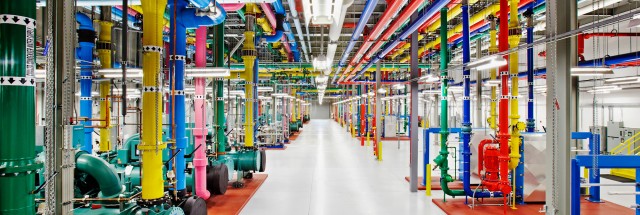Cooling pipes at a Google data center in Douglas County, Georgia.
Google’s greenhouse gas emissions have surged 48 percent in the past five years due to the expansion of its data centers that underpin artificial intelligence systems, leaving its commitment to get to “net zero” by 2030 in doubt.
The Silicon Valley company’s pollution amounted to 14.3 million tonnes of carbon equivalent in 2023, a 48 percent increase from its 2019 baseline and a 13 percent rise since last year, Google said in its annual environmental report on Tuesday.
Google said the jump highlighted “the challenge of reducing emissions” at the same time as it invests in the build-out of large language models and their associated applications and infrastructure, admitting that “the future environmental impact of AI” was “complex and difficult to predict.”
Chief Sustainability Officer Kate Brandt said the company remained committed to the 2030 target but stressed the “extremely ambitious” nature of the goal.
“We do still expect our emissions to continue to rise before dropping towards our goal,” said Brandt.
She added that Google was “working very hard” on reducing its emissions, including by signing deals for clean energy. There was also a “tremendous opportunity for climate solutions that are enabled by AI,” said Brandt.
As Big Tech giants including Google, Amazon, and Microsoft have outlined plans to invest tens of billions of dollars into AI, climate experts have raised concerns about the environmental impacts of the power-intensive tools and systems.
In May, Microsoft admitted that its emissions had risen by almost a third since 2020, in large part due to the construction of data centers. However, Microsoft co-founder Bill Gates last week also argued that AI would help propel climate solutions.
Meanwhile, energy generation and transmission constraints are already posing a challenge for the companies seeking to build out the new technology. Analysts at Bernstein said in June that AI would “double the rate of US electricity demand growth and total consumption could outstrip current supply in the next two years.”
In Tuesday’s report, Google said its 2023 energy-related emissions—which come primarily from data center electricity consumption—rose 37 percent year on year and overall represented a quarter of its total greenhouse gas emissions.
Google’s supply chain emissions—its largest chunk, representing 75 percent of its total emissions—also rose 8 percent. Google said they would “continue to rise in the near term” as a result in part of the build-out of the infrastructure needed to run AI systems.
Google has pledged to achieve net zero across its direct and indirect greenhouse gas emissions by 2030 and to run on carbon-free energy during every hour of every day within each grid it operates by the same date.
However, the company warned in Tuesday’s report that the “termination” of some clean energy projects during 2023 had pushed down the amount of renewables it had access to.
Meanwhile, the company’s data center electricity consumption had “outpaced” Google’s ability to bring more clean power projects online in the US and Asia-Pacific regions.
Google’s data center electricity consumption increased 17 percent in 2023, and amounted to approximately 7-10 percent of global data center electricity consumption, the company estimated. Its data centers also consumed 17 percent more water in 2023 than during the previous year, Google said.
© 2024 The Financial Times Ltd. All rights reserved. Not to be redistributed, copied, or modified in any way.

